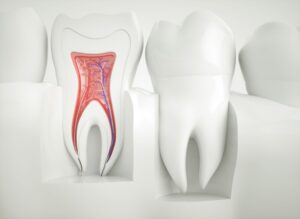
Many people experience anxiety around dental visits, especially if they have a major procedure coming up, like a root canal. If you’re worried that the treatment will be long and agonizing, you might procrastinate scheduling your appointment, allowing the infection in your tooth to worsen.
It might ease your mind to know that this surgery typically alleviates more pain than it causes. However, following your dentist’s post-op instructions in detail is essential to ensure that you recover as quickly as possible without developing unwanted complications. With that in mind, continue reading to learn 3 tips to help you heal from your root canal!
Tip #1: Address Discomfort
You’ll be numbed and/or sedated for your procedure to help you feel calm and relaxed, but as the medication wears off, it’s normal to experience some mild to moderate aches and inflammation. Usually, these issues fade quickly over the next 2-3 days, but that doesn’t mean you have to live with the pain in the moment. If your provider prescribed pain medications, take them exactly as directed. Otherwise, your symptoms can be alleviated with over-the-counter options like Tylenol or ibuprofen. You can also apply a cold compress or ice pack for temporary relief.
Tip #2: Eat Soft Foods
Your teeth and gums are more tender than usual following a root canal, so it’s recommended that you stick to soft foods for a few days that are easy to chew and swallow. That way, you won’t irritate your already sore tissues. Popular options include scrambled eggs, yogurt, blended fruit smoothies, applesauce, and mashed potatoes. Avoid anything overly hot, hard, crunchy, sugary, or spicy that can exacerbate your discomfort or result in tooth sensitivity. It can also help to avoid chewing on the side of your mouth that was treated.
Tip #3: Wait to Brush
Although you’ll need to keep your mouth clean after your procedure, you should avoid brushing and flossing your treated tooth for at least 24 hours. Instead, rinse with lukewarm salt water to naturally eradicate germs and remove any food particles. The next day, you can graduate to gently scrubbing your teeth with a soft-bristled brush to avoid pushing too hard against your tender tissues. Your dentist might recommend avoiding flossing for a couple of days, to ensure that your treated tooth has ample time to recover before gliding string along your swollen gums.
Now that you know more about what to anticipate from your root canal and recovery, you can see that there’s nothing to be afraid of!
About the Practice
At OakBrook Dental & Orthodontics, you and your family benefit from a team of experts who offer a full range of services conveniently under one roof. With board-certified orthodontists and general dentists available, there’s no problem too simple or complex for them to handle. They treat people of all ages, and combine a friendly and comfortable atmosphere with state-of-the-art equipment to deliver advanced treatments for accurate results. If you have a toothache or need a root canal, you can request an appointment on the website or by calling (469) 526-4040.

